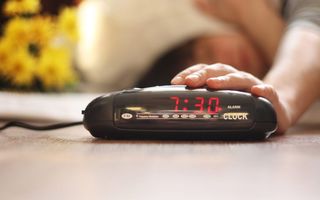Sleep
Reasons to Skip the Snooze Button
Why this old pastime should be phased out.
Posted July 3, 2019

How often do you press the snooze button?
It is an old pastime, likely from your high school days. The alarm blares, and you, half dazed, slap the clock, hoping it will stop so you can get some much-needed rest. Only it goes off again what feels like seconds later, even if it’s really seven-to-nine minutes later, and after the fourth time, you’re late for school. Now you’re an adult, and the same tradition seems to hold, at least for many.
So why was the snooze something that you started using back in high school and probably shouldn’t use now? It’s all based on your chronotype, of course.
Most of us were a WOLF (aka night owls) during high school because that is how human biology works. So of course, we needed extra prodding and pushing to get up in the morning, because our melatonin faucet was still flowing at whatever insane time we had to get up as a teenager.
As an adult, the science looks a little different. Only 15 percent of adults are still WOLVES. Wolves get one snooze, but that is it. Do you know if you are a Wolf? Click here to figure it out quickly. All other Chronotypes should stop using the snooze button. The alarm will sound in the early morning hours and you’ll slap the snooze button at the very end of your sleep cycle. This is when your brain is actually going into REM sleep and when much of the mental restoration of your brain occurs.
If you want a better memory, don’t use the snooze
Each stage of sleep has a different arousal threshold or point where you will wake up. If you are awakened from a deep stage of sleep like REM by a sudden jolt of sound or movement, a “fight or flight” response goes off in your brain. Meaning, “your body reacts as if there is some kind of emergency." This causes your levels of adrenaline and cortisol to increase dramatically, which in turn increases blood pressure, heart rate, and cardiovascular function. This is fine when it happens one time, but if you hit the snooze two, three, four, or five times you are basically shocking yourself awake multiple times a morning. Over time this is not a positive behavior.
The amount of time you have between snoozes is not enough to get you back into a deep restorative state. It takes the body a minimum of 15-20 minutes to get back into any deeper stage of sleep. So, you are wasting your final minutes with light, lousy sleep.
Here’s what to do instead of hitting the snooze button:
- Know your chronotype and stick to your biologically prescribed bedtime.
- If you are a WOLF, you can use the snooze one time but try not to do it daily.
- Set your alarm for the last possible moment for you to get up and put the clock or alarm across the room so you have to get out of bed to turn it off.
- Have a “Wake up Buddy” who will call you in the morning and help motivate you.
- Have Sex instead. For most chronotypes, the best time to have sex, based on arousal, libido, and performance is in the morning. If you are trying to think of a great way to start your day, this could work perfectly.
I know how tempting it can be to hit the snooze button, especially on the weekends. Use my bedtime calculator combined with your chronotype and figure out when you should go to bed to get the optimum amount of sleep. Do yourself and your body a favor and just get up and turn off the alarm. Then, get about 15 minutes of sunlight or bright light exposure to stop the production of melatonin, drink a large glass of water, and start your day.
Sleep well, be well,
Dr. Michael Breus


